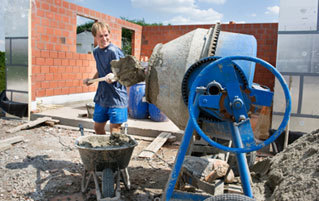5 Horrifying Hazards of Seemingly Normal Jobs

Statistically, about 70 percent of you think your job sucks. And you may be right, but sometimes it's nice to sit back and appreciate that mind-numbing tedium still beats gruesome disfigurement and sudden death -- things that are more common than you think. In fact, the modern world was built on jobs with utterly horrific yet oddly random dangers that workers had no choice but to soldier through.
Just consider the fact that ...
Hat Makers Had a Terrifying Brain Disease Named After Them

What could be more quaint and charming than someone spending their work day making flamboyant felt hats for fancy hat-wearing folk? It seems like the work of a kindly old man in a shop, right next door to the confectioner and wacky inventor. The only thing is, do you ever wonder where the name of the character "The Mad Hatter" came from? It's from the fact that hat making destroys your fucking brain in slow, horrific fashion.
Before the invention of synthetic fabrics, the felt used in the making of hats had to be skinned directly from the corpses of animals. Workers had the delightful option of using either camel urine or their own urine to soak the animal fur until it was soft enough to be removed from the animal without damaging the fur in the process. But then, thankfully, they switched to mercury. Yay! No more going home smelling like camel piss, guys!

Not ... that there's anything wrong with that. No offense intended, camel.
Of course, you know what they didn't -- that mercury is definitely not something you want to handle without protection. You don't want to breathe it, either -- the compound the workers used produced large amounts of mercury vapor, and thanks to the piss-poor ventilation of the workshops, the workers were regularly exposed to lots of the gas. This caused the workers to develop tremors, also known as "hatter shakes," which made their teeth fall out and caused a whole range of vision and hearing problems. And then it got bad.
Over time, mercury poisoning victims are turned into drooling, bumbling caricatures of their former selves. The workers hallucinated, slurred their speech, and displayed signs of shyness and irritability. They had trouble controlling their tempers, resulting in many an impromptu fistfight at the workplace. They picked fights with their colleagues and strangers who visited the workshops, and sometimes they refused to take orders from bosses, giving rise to the phrase "mad as a hatter."

Hatters gonna hat.
The employees were forced to work under these conditions until the combination of tremors and wacky behavior became too much and they either were fired or simply dropped dead from mercury poisoning. And thus "mad hatter disease" was born. But damn it, when you see a dapper fellow strolling along in a bowler hat, all you can think is "It was all worth it."
Farm Workers Regularly Get Sucked into a Deadly Grain Vortex

Working on a farm: the great American job. Spending your days growing corn and your nights ... drowning to death in that same corn. At least that's the life of the several dozen farm workers who die of grain bin entrapment each year.
A big silo full of corn, as it turns out, is like goddamned quicksand:
So, workers will be inside the silo, cleaning it or whatever, then slip and immediately get sucked into the grain. And while you'd think that lying back in a big pool of corn kernels would be either relaxing or hilarious, and that you could splash around and yell things like "Hey, everybody, I'm the Scrooge McDuck of corn!" the reality is terrifying: One false step and the grain can bury a person in as little as 25 seconds.
And no, you can't just swim your way out. Once it sucks you in, you're done, crushed on all sides by literally tons of the bounty of America's heartland. And this isn't one of those crazy workplace hazards that only existed a hundred years ago -- as many as 80 people have died of grain bin entrapment since 2007, and the rate isn't dropping.

Not a "WHEEE!" moment.
And that's the thing -- lots of substances that seem perfectly harmless in the form of the finished product are man-eating nightmares at the production stage. For example ...
Wet Cement Can Burn Your Skin Off

The photo below is a chemical burn. If you didn't know any better, you might think that person spends his day knee-deep in some harsh cleaning chemical or raw sewage. But that is the kind of thing you may see on the skin of bricklayers, masons, cement pourers, really anyone who works with cement:

Isn't this how the Thing was created?
Most of us who don't give a second thought to such things assume that cement would be no more harmful than stone -- as long as you and it aren't moving toward each other with any velocity, you'd have no problem with, say, pressing it against your genitals. But turning a powder into a solid with nothing more than the addition of water and some stirring requires a serious chemical reaction. And chemicals don't necessarily care what they're reacting to, even if it's the other chemicals that make up your squishy body.
So these "cement burns" are caused by skin exposure to wet Portland cement, which is a type of cement containing alkaline. When mixed with water and applied to its good friend, human skin, Portland cement can literally burn you to the bone and disfigure you horribly and permanently.

You're tempting fate, dude.
You'd think a product this terrifying and dangerous would be rare and carefully restricted, but it's absolutely common in the construction world, which is precisely why so many people get burned. Amateurs often don't know about the skin-melting properties of this compound, so it's not unusual for someone to let the shit sit on their clothes or skin for hours while they try to get their damned deck finished.
Chemical burns can be insidious like that -- they don't feel like anything at first. It's not until well after the end of the workday that your skin starts to change color and fall off. And while you're in the hospital getting skin grafts, you can reflect on the fact that just stopping to scrub with soap and water would have prevented it. And if you think we're exaggerating with this "skin falling off" bit, keep in mind that U.K. handyman Kevan Bloomfield lost his fucking leg after sitting in Portland cement for only a few hours. Appreciating that office job yet?

Yeah, there's probably a better place to rest your balls, buddy.
Working With Textiles Caused Scrotum Cancer

You already probably know that working with textiles is kind of a shit job (yes, your clothes were probably made in a sweatshop), and it was only worse back in the day. When clothing manufacturing modernized back in the 1800s, companies utilized technology called spinning mules, which were 150-foot-long machines used to weave fiber into cloth. And like most machines, they had to be constantly oiled and otherwise maintained in order to prevent breakdowns, which meant someone had to go reaching into the guts of those mechanical monsters to lube 'em up.
Someone small. Like a child.

"Follow me. I'll show you to your new work area."
That's right -- the task of oiling the spinners fell onto young boys who were just entering their teenage years and who made about 30 or 40 cents for a day's work. Because the parts of the machine that had to be lubricated were at the crotch level of the workers, they sprayed oils that would get into their pants, and thanks to the piss-poor hygiene of the workers, it would then seep right into the skin. Of their balls.
The condition produced painful-looking sores on the surface of the scrotum that penetrated deeper, affecting the testicles, then the abdomen, and eventually resulting in death. Over a period of just 20 years, there were about 500 deaths from "mule spinners' cancer," but that's not too surprising, considering that the preferred treatment of the condition among doctors was to dose their poor victims with -- you guessed it -- mercury.

And not the Freddie kind.
Fortunately, mule spinners are now a thing of the past. Unfortunately, the international textile industry still doesn't give much of a shit about worker safety.
If You Work With Dust, You're Working in a Ticking Time Bomb

Even though 90 percent of modern entertainment is entirely explosion-based, very few people actually know an explosion hazard when they see one. For instance, between a car's gas tank and a big pile of flour, you'd think the former would be the one most likely to go up like a bundle of TNT. You'd be wrong.
Basically, any kind of dust can cause an explosion under the right conditions, often with deadly results. Seriously, check the list -- over the years, dust from iron, fiberglass, sunflower seeds, coffee, and even freaking cocoa powder have all spontaneously gone Michael Bay. There were 281 major dust explosions from 1980 to 2005, resulting in 119 deaths and 718 injuries (and that's not taking into account dust explosions that occurred in places already regarded as hot spots for them, such as coal mines). For instance, in 2008, a cloud of freaking sugar blew up a warehouse, killing 11 people and burning more than 60 others. It took almost a week for fire crews to put out the flames.

And thus the Terminator was destroyed.
How does this happen? Well, grab a piece of paper and light it. See how quickly it burns? Now wad another piece tightly into a ball and try it again. See how much harder it is to light now? That's because the flat paper is all surface area -- fires need oxygen, and anything with lots of surface area has a better chance of burning. But tiny particles of dust are nothing but surface area. So it doesn't matter how harmless and nonflammable the substance is as a solid -- break it up into tiny bits and mix it with air, and you've got the potential to leave a goddamned crater in the ground.
What makes this even worse is the tendency for dust explosions to occur in chains, making them almost impossible to outrun. When a small explosion occurs in one part of a factory or warehouse, it loosens up other piles of dust elsewhere in the facility, triggering even bigger explosions. Here's the MythBusters igniting some powdered coffee creamer:
Just imagine that, only much, much bigger. So we guess the lesson for today is, if your job hasn't horribly murdered you yet, take a moment to appreciate that fact.
Elorm Kojo Ntumy would like to thank Georgette for her help in completing this article. Joey Clift is a sketch comedy writer and performer living in Los Angeles. He's written bits and segments for Scare Tactics on SyFy, Tosh.0 on Comedy Central, and World's Deadliest on National Geographic Wild. His sketch group Dumbshit Mountain can be found on YouTube and Facebook.
Related Reading: These aren't the only jobs with shockingly bad drawbacks. Ever imagine living the carefree life of a beer brewer? Get ready for grueling 10 hour days, seven days a week. On the plus side some pretty cool jobs, like bounty hunter, are so easy ANYONE could do them. Not shocked enough yet? Read about these iconic jobs that are going away forever.
